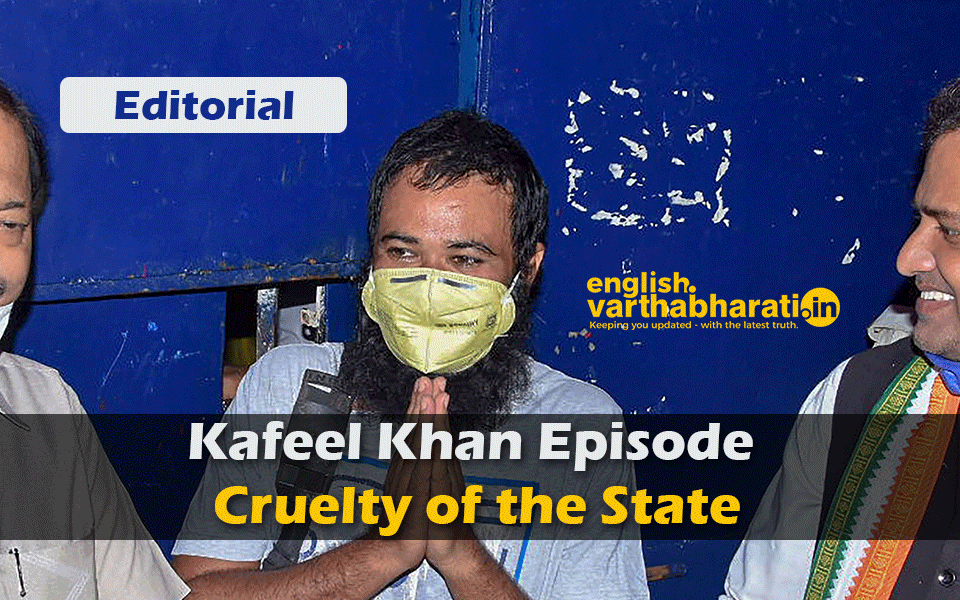The Dr Kafeel Khan episode involving his repeated arrest and release after a grueling nine months reveals the extent of cruelty practiced by those in power. When hundreds of children died due to the paucity of oxygen cylinders as a result of the government’s callousness at a hospital in Uttar Pradesh in 2017, Dr Khan tried hard to save the children. After private contractors stopped the supply of oxygen to the hospital, Dr Khan used his personal finances to purchase oxygen cylinders and saved the lives of many children. He also exposed the maladministration and inefficiency in the hospital. But, the Uttar Pradesh government, instead of punishing those responsible for such systemic inefficiencies, put Dr Khan in the dock. To cover up its failures, it even denied that the death of the children was due to the cut in the supply of oxygen cylinders. It held Dr Khan responsible for the tragedy and became vengeful by torturing him and his family.
The greatest tragedy is that after he was released in the case pertaining to the death of the children, the government tried to falsely implicate Dr Khan under the National Security Act (NSA) and imprison him permanently. The Allahabad High Court on September 1, however, dismissed the case under the NSA in which he was arrested. Issuing a stern order, the court held the Uttar Pradesh government’s order to arrest Dr Khan in February and the subsequent extension of his imprisonment twice as invalid.
After his arrest for the Gorakhpur hospital incident, Dr Khan was released from jail in April 2018 nine months after being jailed. But when Khan started speaking against the government after his release, the police filed another FIR. Using the speech he delivered criticising Citizenship Amendment Act (CAA) as a pretext, the Uttar Pradesh police arrested him on January 29 in Mumbai.
The court subsequently granted bail to Dr Khan on February 10 in the face of stiff opposition from the Uttar Pradesh government. But, the Uttar Pradesh government again immediately arrested Dr Khan under the NSA on February 13. Dr Khan had to spend nearly nine months in jail. In its September 1 historical order, the Allahabad High Court dismissed the arrest of Dr Khan and the subsequent extension of his jail term. The court presented the full text of Dr Khan’s December speech with its order and stated that the speech did not contain any references to disturb peace and law and order which was alleged by the Uttar Pradesh government when it foisted a case against Dr Khan.
The Uttar Pradesh government had weaved all types of strategies to retain Dr Khan in jail and even refused to provide records and files about the arrest. Now, with the arrest and release of Dr Khan, the ways in which the government is misusing the NSA is being discussed extensively. Many people like Dr Khan are rotting in jail for several years under the NSA. The Centre is trying to use the NSA to arrest whoever speaks out against the government’s anti-people policies and completely shut them. In recent years, the NSA is being slapped against the accused even in cow slaughter cases. The Bheem Army party leader Chandrashekar Azad was jailed in June 2017 and September 2018 without conducting any investigation.
Instances of the police misusing the NSA is increasing as the Act allows for imprisonment of the accused for long periods of time without conducting any investigation. This Act snatches away all rights of the accused who are imprisoned including that of appointing lawyers to fight the case and denying opportunities to find out any information about the reasons for the arrest. Analysts are of the opinion that the courts are also adopting delaying tactics while dismissing arrests under the NSA. In the case of Dr Khan, the court took nine months to dismiss his arrest which was completely politically motivated. There are two ways to stop the unlawful arrests under the NSA. One is to repeal the Act completely. Otherwise, political parties must pressurize the Centre against the misuse of the Act. Second, the higher judiciary must consider the arrests under the Act as ‘emergency‘ cases and prevent states from misusing the criminal justice system and extending the period of a person’s imprisonment. Most importantly, officials who are unilaterally using the NSA to imprison people must be handed out severe punishment. Unlawful arrests will end only when such Acts that give special powers to the police are struck down.
Let the Truth be known. If you read VB and like VB, please be a VB Supporter and Help us deliver the Truth to one and all.
Kalaburagi: Four men have been arrested in Kalaburagi on charge of hacking a man with lethal weapons and pelting stones at him under the limits of Station Bazaar Police Station recently.
According to police sources, Anand Jalak Shinde (34), Ashitosh Jalak Shinde (30), Imran Mehboob Sheikh (28) and Sohaib Anwar Qureshi have been arrested. The men are accused of the brutal murder of Syed Mehboob, a resident of Station Bazaar Upper Line Hamalawadi in the city.
An FIR was filed by the Station Bazaar Police Station based on a complaint given by Syed Ismail, father of the deceased Syed Mehboob.
Following quick probe, the police team successfully arrested the suspects within 24 hours. The arrested men were produced in court and have been sent to judicial custody.
The City Police Commissionerate has appreciated in an official release the police team’s quick solving of the murder case and arrest of the four men accused of murdering Syed Mehboob.





